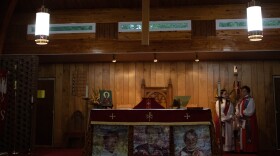This summer WUNC has been working with six youth reporters as part of the Summer Youth Radio Institute in our American Graduate Project.
There’s a dangerous game playing out in North Durham neighborhoods every day. Dashaun Richardson, one of my old classmates, spends most of his time in a neighborhood around Dowd Street, just a few blocks from the WUNC studios. He knows that winning this game means surviving and losing comes with real consequences.
"We was out here fighting in front of the church. That’s when I laid on the ground and I took that beating, boy. I was getting it in at first. That mug came up and snuck me, boy. He caught me from behind, he said BOW, and I dropped to the ground. Next thing I know, it was six people on me just boom, boom, boom," Richardson says.
Richardson is part of what he calls a clique. He says it’s not really a gang. But most people would call it one. It’s mostly made up of people living in the same neighborhood, and like a gang it has a structure to maintain order. Richardson’s clique has 16 laws, an oath, and a pledge. Its system of ranks is almost like a military but instead of a general, they have an OG, original gangsta.
"You have your triple OG, your double OG, your OG, lieutenant, second lieutenant. You got the captains. And you got YG, G, BG, down to the foot soldiers," Richardson explains.
Just like in any hierarchy, there are ways to climb the ladder to the top. Richardson says that to gain rank you have to complete missions. Missions can be anything from fighting someone, to robbing a house. When doing missions, you identify your clique by wearing a specific bandana. He calls it a flag.
"Do I got it?" he asks a friend. "Nah, mine at the house... Ah nah, damn boy, he’s about to beat me, yo. He’s going to beat me. I ain’t got my flag."
Leaving your flag at home is breaking a rule, and that comes with a punishment. But this clique also serves as a support system. My uncle, Humphrey Truitt, worked with youth at risk of getting involved in gangs as a volunteer for the Durham Companions. He knows firsthand the dichotomy of gang life.
"It’s a family and, you know, they consider themselves family. And that family is hard. Once they get into that world it’s hard to be broken. And the certain commitments they have to the gang is true and it’s real," Truitt says.
I was confused about how you could set somebody up, threaten to kill them, rob them, but still see them as family. What I failed to realize was that once you are a part of this life you have people to watch your back. The clique provides support that many of its members have never had before.
"Because at the end of the day we’re all still going to look out for each other. This is my brother. If he’s fighting, I’m fighting with him," Richardson says.
And like family members, they’ve developed their own system for keeping up with and looking out for each other.
"That’s how we alert one of the homies out here, so that’s how we found out where everybody’s at. We go out there, we’ll be like, 'Yeah.' You know how Trey Songz do that, 'Yeah.' So we do it out loud and somebody responds and we’ll be like, 'Oh, that’s such and such.' Like, we done done it so much to the point where we know everybody’s voice. So we’ll be like, 'Yeah. Yeah. Oh, that’s Breeze over there, or that’s Tomato over there. There goes Jalil or whoever.' We just go out there and name some names."
Despite the camaraderie the clique gives him, Richardson says he wants to get out so he can live care free, and worry free. He wants a job, a house, and doesn’t want to have to answer to anybody.
But in order to get out, you get beaten. The only exceptions are veterans. They are usually able to leave without consequences because of the time they have put in. For those members of the clique like Richardson, who haven’t put in as many years, getting out is complicated.
"Do I want to get out this life?" Richardson asks himself. "Yes and no. Yes because I see a dead-end street. And no because I know once I see that dead-end street, I know who actually is going to have my back when I meet it. Maybe stretch that street off just a little bit longer. Just give me just a little bit longer to walk that street before I actually hit the dead end. And that’s what the homies is for."








